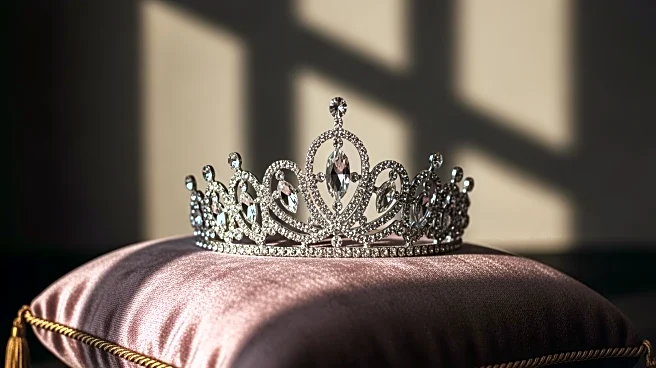What's Happening?
Audrey Eckert from Nebraska has been crowned Miss USA, marking a significant moment for the pageant as it emerges from a period of controversy and change. The event, held at the Grand Sierra Resort in Reno,
Nevada, saw Eckert triumph over 50 other contestants. This year's pageant was notable for several reasons, including the participation of older contestants and the first-ever competitor wearing a hijab. The pageant, which was not televised for the first time since 1963, was instead streamed online. The event follows a tumultuous period for Miss USA, including leadership changes and allegations of a toxic work environment. The new president and CEO, Thom Brodeur, aims to usher in a 'new era' for the pageant.
Why It's Important?
The changes in the Miss USA pageant reflect broader shifts in societal attitudes towards inclusivity and representation. By allowing older contestants and those from diverse backgrounds, the pageant is aligning itself with contemporary values of diversity and inclusion. This move could influence other beauty pageants and similar institutions to adopt more inclusive practices. Additionally, the leadership changes and the resolution of past controversies may restore credibility and interest in the pageant, potentially impacting its viewership and sponsorship opportunities. The pageant's transition to online streaming also highlights a shift in media consumption patterns, which could affect how similar events are broadcast in the future.
What's Next?
Audrey Eckert will represent the United States at the Miss Universe pageant in Thailand next month. The Miss USA organization, under new leadership, is expected to continue implementing changes to improve its image and operations. The ongoing legal disputes involving former president Laylah Rose and the Miss Universe Organization may also see further developments. Stakeholders in the pageant industry will likely monitor these changes closely, as they could set precedents for governance and management practices in similar organizations.
Beyond the Headlines
The Miss USA pageant's recent changes could have long-term cultural implications, particularly in how beauty standards and pageantry are perceived in the U.S. The inclusion of diverse contestants may encourage broader participation and acceptance of different beauty ideals. Additionally, the shift to online streaming could influence how future pageants and similar events are organized and consumed, potentially leading to more interactive and accessible formats.











